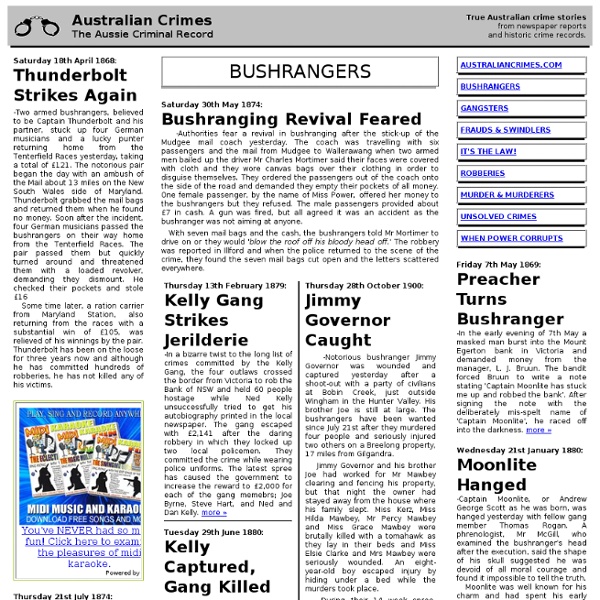Captain Thunderbolt - Tocal's bushranger
Thunderbolt's Cottage Fred Ward worked at Tocal before becoming the notorious bushranger Captain Thunderbolt. Fred was the youngest of 11 children of Michael and Sophia Ward.
The Australian Bushrangers
The Australian Bushrangers Who, What, When, Where Why? The term “Bushranger” has definitely changed over the years. In the very early years, it simply referred to good bush men who possessed the horsemanship, hunting, and survival skills needed for living in the Australian bush, or wild, after they fled Australia’s prison colonies.
Captain Thunderbolt - Tocal's bushranger
Thunderbolt didn't kill anyone Thunderbolt was involved in several shootouts with police, so the fact that he never killed anyone may have been luck, but it added weight to the belief that Thunderbolt was the Gentleman Bushranger, the last of the professional highwaymen. This reputation was earnt by not harming women, often giving some money back, and shouting for everyone at pubs using stolen money.
Bushrangers: Frederick Wordsworth Ward alias Captain Thunderbolt
This photo was taken when he was dead or then again it may be his uncle Harry! (read on to find out why) First of all I would like to say there is much contention and misinformation about Frederick Ward even including his date of birth and death.
Captain Thunderbolt
Frederick Ward Frederick Wordsworth Ward (aka Captain Thunderbolt) (1835–25 May 1870) was an Australian bushranger renowned for escaping from Cockatoo Island, and also for his reputation as the "gentleman bushranger" and his lengthy survival, being the longest roaming bushranger in Australian history.[1] Early years[edit]
Ben Hall (bushranger)
Ben Hall (9 May 1837 – 5 May 1865) was an Australian bushranger of the 19th century. He and his various companions roamed an area of NSW from Bathurst to Forbes, south to Gundagai and east to Goulburn. He was known as "Brave Ben Hall" and has become part of Australian folklore. Ben Hall carried out many audacious raids, some of which were intended to taunt the police.[2] Unlike many bushrangers of the era, he was not directly responsible for any deaths, although several of his companions certainly were [2] He was shot dead by police in May 1865 at the Billabong Creek. The police claimed that they were acting under the protection of the Felons Apprehension Act 1865 which allowed any bushrangers who had been specifically named in under the terms of the Act to be shot and killed by anyone at any time without warning. Unfortunately, at the time of Hall's death, the Felons Act had not come into force, resulting in considerable controversy over the legality his killing.[3]
Frederick (Captain Thunderbolt) Ward
Frederick Ward (1835-1870), bushranger, alias 'Captain Thunderbolt', was born at Windsor, New South Wales. He was working as a drover and horse-breaker at Tocal station on the Paterson River when arrested with James Garbutt and indicted for stealing and receiving seventy-five horses at Maitland on 21 April 1856; Ward was sentenced to ten years' hard labour on 13 August on the receiving charge. Released conditionally from Cockatoo Island late in July 1860, Ward worked as a horse-breaker at Cooyal near Mudgee until his ticket-of-leave was cancelled on 17 September 1861 for 'absence from Muster' and he was tried on 3 October for horse-stealing. Returned to Cockatoo Island to complete his original sentence with an additional three years, Ward escaped with Frederick Brittain about 11 September 1863. in 1864-65 Ward lived quietly with his 'wife', Mary Ann, née Bugg, a half-caste Aboriginal, on the Culgoa River near Bourke with two children. Citation details
Francis (Frank) Gardiner
Francis (Frank) Gardiner (1830-1903?), bushranger, was born in Scotland, son of Charles Christie and his wife Jane, née Whittle. The family reached Sydney in the James in 1834 and settled at Boro near Goulburn.



